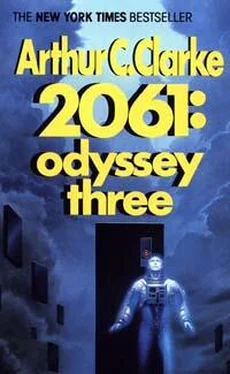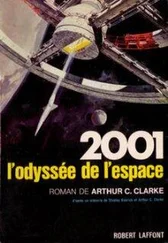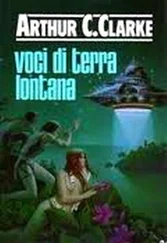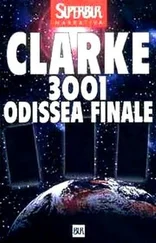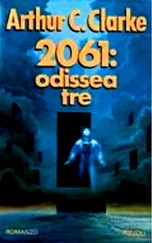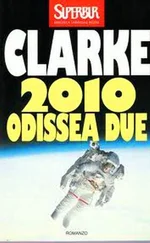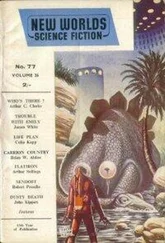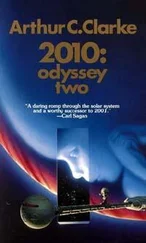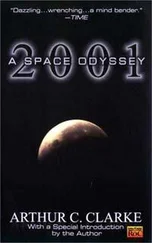Arthur Clarke - 2061 - Odyssey Three
Здесь есть возможность читать онлайн «Arthur Clarke - 2061 - Odyssey Three» весь текст электронной книги совершенно бесплатно (целиком полную версию без сокращений). В некоторых случаях можно слушать аудио, скачать через торрент в формате fb2 и присутствует краткое содержание. Жанр: Фантастика и фэнтези, на английском языке. Описание произведения, (предисловие) а так же отзывы посетителей доступны на портале библиотеки ЛибКат.
- Название:2061: Odyssey Three
- Автор:
- Жанр:
- Год:неизвестен
- ISBN:нет данных
- Рейтинг книги:3 / 5. Голосов: 1
-
Избранное:Добавить в избранное
- Отзывы:
-
Ваша оценка:
- 60
- 1
- 2
- 3
- 4
- 5
2061: Odyssey Three: краткое содержание, описание и аннотация
Предлагаем к чтению аннотацию, описание, краткое содержание или предисловие (зависит от того, что написал сам автор книги «2061: Odyssey Three»). Если вы не нашли необходимую информацию о книге — напишите в комментариях, мы постараемся отыскать её.
2061: Odyssey Three — читать онлайн бесплатно полную книгу (весь текст) целиком
Ниже представлен текст книги, разбитый по страницам. Система сохранения места последней прочитанной страницы, позволяет с удобством читать онлайн бесплатно книгу «2061: Odyssey Three», без необходимости каждый раз заново искать на чём Вы остановились. Поставьте закладку, и сможете в любой момент перейти на страницу, на которой закончили чтение.
Интервал:
Закладка:
'Then I saw that large buds were forming on many of the branches. It was like watching a time-lapse film of flowers opening. In fact I thought they were flowers – each about as big as a man's head.
'Delicate, beautifully coloured membranes started to unfold. Even then, it occurred to me that no-one – no thing – could ever have seen these colours before; they had no existence until we brought our lights – our fatal lights – to this world.
'Tendrils, stamens, waving feebly... I walked over to the living wall that surrounded me, so that I would see exactly what was happening. Neither then, or at any other time, had I felt the slightest fear of the creature. I was certain that it was not malevolent – if indeed it was conscious at all.
'There were scores of the big flowers, in various stages of unfolding. Now, they reminded me of butterflies, just emerging from the chrysalis... wings crumpled, still feeble... I was getting closer and closer to the truth.
'But they were freezing – dying as quickly as they formed. Then, one after another, they dropped off from the parent buds. For a few moments they flopped around like fish stranded on dry land – and at last I realized exactly what they were. Those membranes weren't petals – they were fins, or their equivalent. This was the free-swimming, larval stage of the creature. Probably it spends much of its life rooted on the seabed, then sends these mobile offspring in search of new territory. Just like the corals of Earth's oceans.
'I knelt down to get a closer look at one of the little creatures. The beautiful colours were fading now, to a drab brown. Some of the petal-fins had snapped off, becoming brittle shards as they froze. But it was still moving feebly, and as I approached it tried to avoid me. I wondered how it sensed my presence.
'Then I noticed that the stamens – as I'd called them – all carried bright blue dots at their tips. They looked like tiny star sapphires – or the blue eyes along the mantle of a scallop – aware of light, but unable to form true images. As I watched, the vivid blue faded, the sapphires became dull, ordinary stones...
'Dr Floyd – or anyone else who is listening – I haven't much more time – Jupiter will soon block my signal. But I've almost finished.
'I knew then what I had to do. The cable to that thousand-watt lamp was hanging almost to the ground. I gave it a few tugs, and the light went out in a shower of sparks.
'I wondered if it was too late. For a few minutes, nothing happened. So I walked over to the wall of tangled branches around me, and kicked it.
'Slowly, the creature started to unweave itself, and to retreat back to the Canal. There was plenty of light – I could see everything perfectly. Ganymede and Callisto were in the sky – Jupiter was a huge, thin crescent – and there was a big auroral display on the nightside, at the Jovian end of the Io flux tube. There was no need to use my helmet light.
'I followed the creature all the way back to the water, encouraging it with more kicks when it slowed down, feeling the fragments of ice crunching all the time beneath my boots... As it neared the Canal, it seemed to gain strength and energy, as if it knew that it was approaching its natural home. I wondered if it would survive, to bud again.
'It disappeared through the surface, leaving a few last dead larvae on the alien land. The exposed free water bubbled for a few minutes until a scab of protective ice sealed it from the vacuum above. Then I walked back to the ship to see if there was anything to salvage – I don't want to talk about that...
'I've only two requests to make, Doctor. When the taxonomists classify this creature, I hope they'll name it after me.
'And – when the next ship comes home – ask them to take our bones back to China..
'Jupiter will be cutting us off in a few minutes. I wish I knew whether anyone was receiving me. Anyway, I'll repeat this message when we're in line of sight again – if my suit's life-support system lasts that long.
'This is Professor Chang on Europa, reporting the destruction of spaceship Tsien. We landed beside the Grand Canal and set up our pumps at the edge of the ice...'
The signal faded abruptly, came back for a moment, then disappeared completely below the noise level. There would never be any further message from Professor Chang; but it had already deflected Lawrence Tsung's ambitions into space.
6 – The Greening of Ganymede
Rolf van der Berg was the right man, in the right place, at the right time; no other combination would have worked. Which, of course, is how much of history is made.
He was the right man because he was a second-generation Afrikaner refugee, and a trained geologist; both factors were equally important. He was in the right place, because that had to be the largest of the Jovian moons – third outwards in the sequence Io, Europa, Ganymede, Callisto.
The time was not so critical, for the information had been ticking away like a delayed-action bomb in the data banks for at least a decade. Van der Berg did not encounter it until '57; even then it took him another year to convince himself that he was not crazy – and it was '59 before he had quietly sequestered the original records so that no-one could duplicate his discovery. Only then could he safely give his full attention to the main problem: what to do next.
It had all begun, as is so often the case, with an apparently trivial observation in a field which did not even concern van der Berg directly. His job, as a member of the Planetary Engineering Task Force, was to survey and catalogue the natural resources of Ganymede; he had little business fooling around with the forbidden satellite next door.
But Europa was an enigma which no-one – least of all its immediate neighbours – could ignore for long. Every seven days it passed between Ganymede and the brilliant minisun that had once been Jupiter, producing eclipses which could last as long as twelve minutes. At its closest, it appeared slightly smaller than the Moon as seen from Earth, but it dwindled to a mere quarter of that size when it was on the other side of its orbit.
The eclipses were often spectacular. Just before it slid between Ganymede and Lucifer, Europa would become an ominous black disc, outlined with a ring of crimson fire, as the light of the new sun was refracted through the atmosphere it had helped to create.
In less than half a human lifetime, Europa had been transformed. The crust of ice on the hemisphere always facing Lucifer had melted, to form the Solar System's second ocean. For a decade it had foamed and bubbled into the vacuum above it, until equilibrium had been reached. Now Europa possessed a thin but serviceable – though not to human beings – atmosphere of water vapour, hydrogen sulphide, carbon and sulphur dioxides, nitrogen, and miscellaneous rare gases. Though the somewhat misnamed 'nightside' of the satellite was still permanently frozen, an area as large as Africa now had a temperate climate, liquid water, and a few scattered islands.
All this, and not much more, had been observed through telescopes in Earth orbit. By the time that the first full-scale expedition had been launched to the Galilean moons, in 2028, Europa had already become veiled by a permanent mantle of clouds. Cautious radar probing revealed little but smooth ocean on one face, and almost equally smooth ice on the other; Europa still maintained its reputation as the flattest piece of real estate in the Solar System. Ten years later, that was no longer true: something drastic had happened to Europa. It now possessed a solitary mountain, almost as high as Everest, jutting up through the ice of the twilight zone. Presumably some volcanic activity – like that occurring ceaselessly on neighbouring Io – had thrust this mass of material skywards. The vastly increased heat-flow from Lucifer could have triggered such an event.
Читать дальшеИнтервал:
Закладка:
Похожие книги на «2061: Odyssey Three»
Представляем Вашему вниманию похожие книги на «2061: Odyssey Three» списком для выбора. Мы отобрали схожую по названию и смыслу литературу в надежде предоставить читателям больше вариантов отыскать новые, интересные, ещё непрочитанные произведения.
Обсуждение, отзывы о книге «2061: Odyssey Three» и просто собственные мнения читателей. Оставьте ваши комментарии, напишите, что Вы думаете о произведении, его смысле или главных героях. Укажите что конкретно понравилось, а что нет, и почему Вы так считаете.
